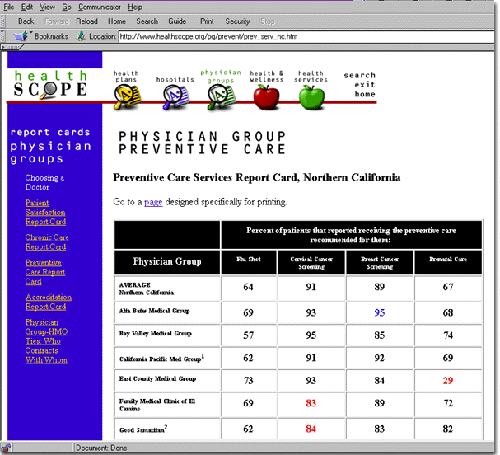
Fam Pract Manag. 1999;6(6):49
You may be surprised to know that “report cards” on you or your practice soon could be available to the public via the World Wide Web. But given the increasingly pervasive reach of the Internet, it really was only a matter of time.
For example, a site called Health Scope (www.healthscope.org/pg/prevent/index.htm), maintained by the Pacific Business Group on Health, publishes a Preventive Care Services Report Card that compares how dozens of practices in Northern California, Oregon and Washington stack up according to the percentage of their patients who report having received recommended preventive care. Based on surveys with patients, this consumer advocacy site also reports how patients rate the care they received from their physicians over the previous year for treatment of hypertension and high cholesterol.

Another example comes from PacifiCare of California, which publishes its Quality Index twice a year (see www.pacificare.com/california/members/qindex/index.asp). The index rates medical groups in 28 areas related to clinical care, service and administration. The information includes screening rates for breast cancer and diabetes-related eye problems, as well as patient satisfaction with the referral process. As the health plan's web site explains, one purpose of the index is to develop “healthy competition among physician groups —competition that will ultimately lead to higher quality throughout our network.”
In New York, the Department of Health publishes outcomes data for consumers that include, for example, surgeon-specific rates for total number of cases and mortality associated with coronary artery bypass surgery (www.health.state.ny.us/nysdoh/consumer/heart/homehear.htm). It also provides expected and risk-adjusted mortality rates by medical facility (through 1996).
How accurate and useful are the data reported on these sites? That's the big issue. Here are some questions to ask as you review sites that offer physician performance data (and issues to raise with patients who might bring this information to you): How old are the data being reported? Are the differences in performance numbers statistically significant? Were the data collected by researchers or reported by the patients themselves? Are the outcomes risk-adjusted? The standards for judging the value of a site that reports physician performance data should be these: Is it fair, is it accurate and is it helpful to patients?